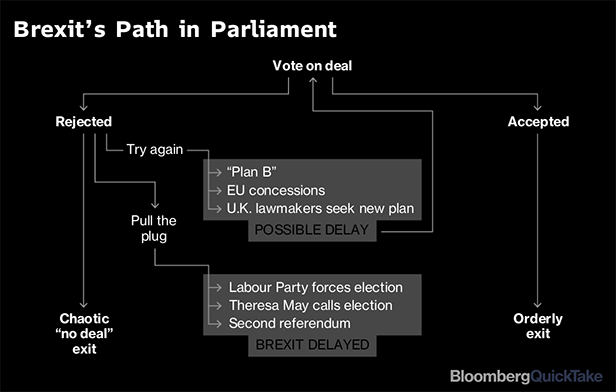Prime Minister Theresa May's Brexit deal was rejected by Parliament in a humiliating defeat, her plan for leaving the European Union (EU) all but dead. She now faces a confidence vote in her government.
The House of Commons voted 432 versus 202 against the divorce that the U.K. government brokered with the European Union. A margin of less than 60 votes would have given grounds to hope that the deal was salvageable, with the EU poised to engage in ways to make it more palatable.
Now, more than two years after the U.K. voted to leave the 28-nation EU bloc, the U.K. is facing political paralysis over a decision that has divided the nation and its political class for decades. The largest parliamentary defeat in over a century prompted the main opposition Labour Party to pounce with a confidence motion to try to force a general election.
Recommended For You
The vote will be at 7 p.m. on Wednesday.
“It is clear the House does not support this deal,” May told lawmakers following the vote. “But tonight's vote tells us nothing about what it does support,” she said, pledging to talk to her Northern Irish allies and senior politicians across Parliament to try to reach a consensus. “The government will approach these meetings in a constructive spirit.”
A government spokesman later told reporters that May doesn't believe her Brexit deal is dead, and that cross-party discussions could be the basis for future agreement. The spokesman said those talks would begin as soon as Thursday, and that ideas coming from those discussions would need to be put to the EU.
See also:
- EU Plans One-Year Derivatives Fix to Prevent Brexit Rupture
- Risk of Messy Brexit Mobilizes Corporate Europe and Its Bankers
- Brexit Financial-Market Threat
- Stockpiling Blood and Food
But May also acknowledged the “scale and importance” of the vote and said the first step must be to confirm that lawmakers still have confidence in her government.
The early signs are that May is likely to win the confidence vote. Northern Ireland's Democratic Unionist Party, which props up her government, indicated it will support May, as did the group of pro-Brexit Tories which led a failed effort to oust her over her Brexit strategy late last year.
May's choices are limited by the fact that her Conservative party does not have a majority in Parliament and the competing interests of lawmakers who want a clean break from the EU and those who want to preserve close ties to the bloc. An opposition party with a sniff of power also complicates matters.
The U.K. is scheduled to leave on March 29, and an increasingly boxed-in prime minister could well decide to ask fellow EU leaders for an extension—though her spokesman said the government has no plan to do so.

The initial reaction to the vote from Brussels was not positive.
“The risk of a disorderly exit has increased with this vote,” the spokesman for EU President Donald Tusk said in a text message. “While we do not want this to happen, we will be prepared for it.”
From: Bloomberg
© 2025 ALM Global, LLC, All Rights Reserved. Request academic re-use from www.copyright.com. All other uses, submit a request to [email protected]. For more information visit Asset & Logo Licensing.




